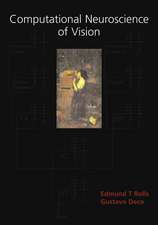Response Times: Their Role in Inferring Elementary Mental Organization: Oxford Psychology Series, cartea 8
Autor R. Duncan Luceen Limba Engleză Paperback – 17 oct 1991
| Toate formatele și edițiile | Preț | Express |
|---|---|---|
| Paperback (1) | 712.84 lei 41-52 zile | |
| Oxford University Press – 17 oct 1991 | 712.84 lei 41-52 zile | |
| Hardback (1) | 1210.79 lei 41-52 zile | |
| Oxford University Press – 24 iul 1986 | 1210.79 lei 41-52 zile |
Din seria Oxford Psychology Series
- 33%
 Preț: 810.06 lei
Preț: 810.06 lei - 18%
 Preț: 342.56 lei
Preț: 342.56 lei - 31%
 Preț: 1986.81 lei
Preț: 1986.81 lei - 16%
 Preț: 315.80 lei
Preț: 315.80 lei - 23%
 Preț: 351.68 lei
Preț: 351.68 lei - 14%
 Preț: 342.55 lei
Preț: 342.55 lei - 34%
 Preț: 383.36 lei
Preț: 383.36 lei - 14%
 Preț: 634.84 lei
Preț: 634.84 lei - 23%
 Preț: 358.93 lei
Preț: 358.93 lei - 37%
 Preț: 1700.36 lei
Preț: 1700.36 lei - 34%
 Preț: 691.41 lei
Preț: 691.41 lei - 35%
 Preț: 479.62 lei
Preț: 479.62 lei - 31%
 Preț: 502.84 lei
Preț: 502.84 lei - 14%
 Preț: 725.26 lei
Preț: 725.26 lei - 27%
 Preț: 519.16 lei
Preț: 519.16 lei -
 Preț: 368.59 lei
Preț: 368.59 lei - 50%
 Preț: 827.13 lei
Preț: 827.13 lei - 25%
 Preț: 383.70 lei
Preț: 383.70 lei - 19%
 Preț: 458.01 lei
Preț: 458.01 lei - 34%
 Preț: 869.88 lei
Preț: 869.88 lei - 24%
 Preț: 381.70 lei
Preț: 381.70 lei - 18%
 Preț: 330.41 lei
Preț: 330.41 lei - 39%
 Preț: 1312.26 lei
Preț: 1312.26 lei - 34%
 Preț: 1260.44 lei
Preț: 1260.44 lei - 34%
 Preț: 657.75 lei
Preț: 657.75 lei - 8%
 Preț: 337.20 lei
Preț: 337.20 lei - 31%
 Preț: 468.62 lei
Preț: 468.62 lei - 34%
 Preț: 1261.44 lei
Preț: 1261.44 lei - 34%
 Preț: 887.46 lei
Preț: 887.46 lei - 50%
 Preț: 565.66 lei
Preț: 565.66 lei -
 Preț: 128.95 lei
Preț: 128.95 lei -
 Preț: 310.27 lei
Preț: 310.27 lei - 11%
 Preț: 422.42 lei
Preț: 422.42 lei - 34%
 Preț: 1550.44 lei
Preț: 1550.44 lei - 27%
 Preț: 546.42 lei
Preț: 546.42 lei - 37%
 Preț: 653.24 lei
Preț: 653.24 lei - 34%
 Preț: 562.58 lei
Preț: 562.58 lei - 34%
 Preț: 829.24 lei
Preț: 829.24 lei - 6%
 Preț: 510.10 lei
Preț: 510.10 lei - 31%
 Preț: 458.93 lei
Preț: 458.93 lei - 31%
 Preț: 427.63 lei
Preț: 427.63 lei - 37%
 Preț: 646.49 lei
Preț: 646.49 lei - 27%
 Preț: 369.96 lei
Preț: 369.96 lei - 24%
 Preț: 400.59 lei
Preț: 400.59 lei
Preț: 712.84 lei
Preț vechi: 828.88 lei
-14%
Puncte Express: 1069
Preț estimativ în valută:
126.03€ • 148.60$ • 110.18£
126.03€ • 148.60$ • 110.18£
Carte tipărită la comandă
Livrare economică 03-14 aprilie
Specificații
ISBN-13: 9780195070019
ISBN-10: 0195070011
Pagini: 584
Ilustrații: black and white photographs and line figures
Dimensiuni: 154 x 229 x 37 mm
Greutate: 0.91 kg
Editura: Oxford University Press
Colecția OUP USA
Seria Oxford Psychology Series
Locul publicării:New York, United States
ISBN-10: 0195070011
Pagini: 584
Ilustrații: black and white photographs and line figures
Dimensiuni: 154 x 229 x 37 mm
Greutate: 0.91 kg
Editura: Oxford University Press
Colecția OUP USA
Seria Oxford Psychology Series
Locul publicării:New York, United States
Recenzii
"An extensive and well presented account...Will certainly remain the basic reference for years to come...The book will be useful to many, whether or not they are theoretically inclined, and will be mandatory reading for anyone dealing with behavioral response times."--Science
"Fascinating and essential reading....This book has great richness to offer: to the cognitive scientist, using artificial intelligence and computational techniques as the main vehicle for modelling cognitive and perceptual processes; to the researcher, wishing only to use response times as a well-honed tool; as well as to the committed traditional mathematical psychologist....An important book which many psychologists will find both intriguing and useful. Every academic library should own it."--British Journal of Psychology
"This is an important book for those who study response times or use them as tools. What about those who find mathematics indigestible? The fact is that there are not many clearer expositions of response times, with or without mathematics. In many cases, the author's presentation of work is clearer than the original literature....This book has something for everyone who is seriously interested in response times: a history, a handbook, and a glimpse of our future science." --Contemporary Psychology
"Fascinating and essential reading....This book has great richness to offer: to the cognitive scientist, using artificial intelligence and computational techniques as the main vehicle for modelling cognitive and perceptual processes; to the researcher, wishing only to use response times as a well-honed tool; as well as to the committed traditional mathematical psychologist....An important book which many psychologists will find both intriguing and useful. Every academic library should own it."--British Journal of Psychology
"This is an important book for those who study response times or use them as tools. What about those who find mathematics indigestible? The fact is that there are not many clearer expositions of response times, with or without mathematics. In many cases, the author's presentation of work is clearer than the original literature....This book has something for everyone who is seriously interested in response times: a history, a handbook, and a glimpse of our future science." --Contemporary Psychology
Cuprins
Representing response times as random variables; DETECTION PARADIGMS: Simple reaction times: basic data; Decomposition into decision and residual latencies; Distribution of simple decision latencies; Detection of signals presented at irregular times; IDENTIFICATION PARADIGMS: Two-choice reaction times: basic ideas and data; Mixture models; Stochastic accumulation of information in discrete time; Stochastic accumulation of information in continuous time; Absolute identification of more than two signals; MATCHING PARADIGMS: Memory scanning, visual search, and same-difference designs; Processing stages and strategies; Appendixes; References; Indexes.










